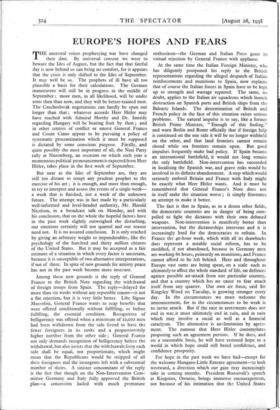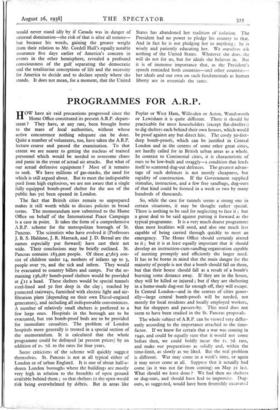EUROPE'S HOPES AND FEARS T HE ancestral voices prophesying war have
changed their date. By universal consent we were to beware the Ides of August, but the fact that that fateful day is now behind us can bring no comfort, for it appears that the crisis is only shifted to the Ides of September. It may well be so. The prophets of ill have all too plausible a basis for their calculations. The German manoeuvres will still be in progress in the middle of September ; more men, in all likelihood, will be under arms then than now, and they will be better-trained men. The Czechoslovak negotiations can hardly be spun out longer than that ; whatever accords Herr Hitler may have reached with Admiral Horthy and Dr. Imredy regarding Hungary will be bearing fruit by then ; and in other centres of conflict or unrest General Franco and Count Ciano appear to be pursuing a policy of systematic procrastination which it must be supposed is dictated by some conscious purpose. Finally, and quite possibly the most important of all, the Nazi Party rally at Nuremberg, an occasion on which each year a momentous political pronouncement is expected from Herr Hitler, takes place in the first week of September.
But near as the Ides of September are, they are still too distant to tempt any prudent prophet to the exercise of his art ; it is enough, and more than enough, to try to interpret and assess the events of a single week— a week that is finished, not a week of the unknown future. The attempt was in fact made by a particularly well-informed and level-headed authority, Mr. Harold Nicolson, in a broadcast talk on Monday, and with his conclusion, that on the whole the hopeful factors have in the past week slightly outweighed the disturbing, our emotions certainly will not quarrel and our reason need not. It is no assured conclusion. It is only reached by giving an arbitrary weight to imponderables, like the psychology of the hundred and thirty million citizens of the United States. But it may be accepted as a fair estimate of a situation in which every factor is uncertain, because it is susceptible of two alternative interpretations, if not of three. In spite of new grounds for anxiety peace has not in the past week become more insecure.
Among these new grounds is the reply of General Franco to the British Note regarding the withdrawal of foreign troops from Spain. The reply—delayed for more than six weeks without any reputable reason—is not a flat rejection, but it is very little better. Like Signor Mussolini, General Franco wants to reap benefits that were offered conditionally without fulfilling, or before fulfilling, the essential condition. Recognition of belligerency was offered when a minimum of 10,000 men had been withdrawn from the side found to have the fewer foreigners in its ranks and a proportionately higher number from the other side ; General Franco not only demands recognition of belligerency before the withdrawal, but also insists that the withdrawals from each side shall be equal, not proportionate, which might mean that the Republicans would be stripped of all their foreigners and the insurgents left with a substantial number of theirs. A sinister concomitant of the reply is the fact that though on the Non-Intervention Com- mittee Germany and Italy fully approved the British plan—a concession hailed with much premature enthusiasm—the German and Italian Press greet its virtual rejection by General Franco with applause.
At the same time the Italian Foreign Minister, who has diligently postponed his reply to the British representations regarding the alleged despatch of Italian reinforcements and munitions to Spain, now explains that of course the Italian forces in Spain have to be kept up to strength and wastage repaired. The same, no doubt, applies to the Italian air squadrons which launch destruction on Spanish ports and British ships from the Balearic Islands. The determination of British and French policy in the face of this situation raises serious problems. The natural impulse is to say, like a former British Prime Minister, " Enough of this fooling," and warn Berlin and Rome officially that if foreign help is continued on the one side it will be no longer withheld on the other, and that land frontiers cannot remain closed while sea frontiers remain open. But good impulses frequently -make bad policy. If Spain became an international battlefield, it would not long remain the only battlefield. Non-intervention has- succeeded in localising the Spanish war, and grave risks would be involved in its definite abandonment. A step which would seriously embroil Britain and France with Italy might be exactly what Herr Hitler wants. And it must be remembered that General Franco's Note does not in itself make the situation worse ; it simply frustrates an attempt to make it better.
The fact is that in Spain, as in a dozen other fields, the democratic countries are in danger of being corn, pelled to fight the dictators with their own debased weapons. Non-intervention is manifestly better than intervention, but the dictatorships intervene and it is increasingly hard for the democracies to refrain. In France the 40-hour week, which with all its drawbacks does represent a notable social reform, has to be modified, if not abandoned, because in. Germany men are working 6o hours, primarily on munitions, and France cannot afford to be left behind. Here and throughout Europe vast sums are being spent, on a scale such as ultimately to affect the whole standard of life, on defences against possible air-attack from one particular country, and that a country which has no cause to fear attack itself from any quarter. Our own air force, said Sir Kingsley Wood on Tuesday, is growing stronger every day. In the circumstances . we must welcome the announcement, for in the circumstances to be weak is to invite attack. But if the race in armaments does not end in war, it must ultimately end in ruin, and in ruin which may involve a social as well as a financial cataclysm. The alternative is air-limitation by agree-. ment. The rumour that Hem Hitler contemplates proposing such an agreement persists. If he does, and on a reasonable basis, he will have restored hope to a world in which hope could still breed confidence, and confidence prosperity.
For hope in the past week we have had—except for the welcome Hungaro-Little Entente agreement—to look westward, a direction which our gaze may increasingly take in coming months. President Roosevelt's speech at Kingston, Ontario, brings immense encouragement, not because of his intimation that the United' ,States would never stand idly by if Canada was in danger of external domination—the risk of that is after all remote— but because his words, gaining the greater weight from their relation to Mr. Cordell Hull's equally notable assurance five days earlier of America's concern in events in the other hemisphere, revealed a profound consciousness of the gulf separating the democratic and the totalitarian conceptions of life and the necessity for America to decide and to declare openly where she stands. It does not mean, for a moment, that the United States has abandoned her tradition of isolation. The President had no power to pledge his country to that. And in fact he is not pledging her to anything ; he is wisely and patiently educating her. We ourselves ask nothing of the United States. Whatever she does, she will do not for us, but for ideals she believes in. But it is of immense importance that, as the President's speech reminded both countries—and other countries— her ideals and our own on such fundamentals as human liberty are in essentials the same.



































 Previous page
Previous page